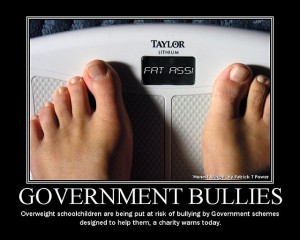More on childhood obesity and shaming….this morning I read a post by Jessica Gottlieb and although I agree with her premise and a “little shame is good”, I was disturbed by the idea of using shame to change behavior.
As a social worker I know “shaming” in childhood can cause many serious problems later in childhood and in life. It is a complex emotion worth ‘unpacking’ as we say in the therapeutic setting.
Jessica said…It starts getting murky when we discuss shame and fat. Do I think that people should be shamed for being fat? As in telling them, “You should be ashamed of yourself.”? Of course not. Do I think that feeling ashamed of yourself is a natural consequence of being very fat? Yes, we all know that to be true. Recently there was an outcry about billboards in Georgia “fat shaming” kids. Anyone sensible can see that they weren’t bringing shame to children, they simply acknowledged the fact that children were feeling ashamed and that one of the many side effects of obesity is that your get ready for it self esteem takes a dive.
via Sometimes Parenting With a Little Shame is a Good Thing | Jessica Gottlieb A Los Angeles Mom.
Strong4Life began a childhood obesity campaign in Georgia earlier this year. Billboards of obese children were part of that campaign. This raised the ire of those who are opposed to “shaming” fat children which they said these billboards did. Strong4Life of course emphatically stated this was not the purpose of their billboard campaign.
This week, I am happy to report that the billboard campaign is taking a new direction and the billboards are being removed. I believe that the current rate of obesity and its longterm health effects on children is a tragedy. Almost anything that helps to educate and prevent this health epidemic should be done. I am not sure that the billboards were entirely shaming and that they gave license to bullying fat children…that is already being done without the billboards.
At the end of January 2012, Leah Segedie, a fitness blogger and founder of Mamavation, sounded the alarm about a childhood obesity campaign in Georgia that was shaming overweight kids. The Strong 4 Life campaign included a series of billboards, print ads, television ads, and social media featuring overweight children. The children talk about the negative social and health impacts of their size, including being excluded and made fun of by classmates.
via Georgias Fat Shaming Child Obesity Billboards Coming Down | Care2 Causes.
In some way “shaming” became the forefront of this Strong4Life campaign which is not a bad thing since it seems there is some confusion between shaming and being embarrassed or experiencing guilt by one’s own behavior.
There are different forms of shame and in the extreme form shame can be very problematic. There really is no simplistic understanding of shame and what it does to a child who experiences to an extreme.
According to Alen J. Salerian, M.D., psychiatrist and medical director of the Washington, D.C., Psychiatric Center Outpatient Clinic, shame is a complex emotional response that all humans acquire during early development. “It’s a normal feeling about ourselves and our behavior,” he said, “not necessarily a symptom of an illness or pathology. In many situations, it’s abnormal if we don’t experience it.”Embarrassment and shyness, for example, are two forms of shame that seldom cause trouble — unless they’re extreme or long lasting. And humility, another of the forms shame can take, is generally considered socially desirable.But there’s mounting evidence that problems occur when shame or humiliation becomes an integral part of a person’s self-image or sense of self-worth. Over the past two decades, psychologists, psychiatrists and other mental health professionals have reported that abnormal styles of handling shame play an important role in social phobias, eating disorders, domestic violence, substance abuse, road rage, schoolyard and workplace rampages, sexual offenses and a host of other personal and social problems.
“Unlike guilt, which is the feeling of doing something wrong,” she said, “shame is the feeling of being something wrong. When a person experiences shame, they feel ‘there is something basically wrong with me.’”
Many people are still convinced that smacking or shaming are the only antidotes for preventing antisocial behaviors in children. The suggestion of giving up shaming or smacking is misinterpreted by some as attempts to disempower parents; to turn them into guilt-laden, ineffectual and permissive wimps. Not so. The most effective and healthy boundaries can be set without resorting to violence or shaming. Being strong with children does not mean being harsh, or humiliating.There are alternatives to shaming that are healthier and more effective. Children who are shown consistent boundaries by parents who are able to express their feelings and needs in a trusting and respectful way, grow up with stronger self-worth and social awareness, free of the toxic effects of shame.
via “Good” Children – at What Price? The Secret Cost of Shame – The Natural Child Project.
“Shaming” which makes anyone feel a lack of self worth is not what I believe was the goal of the Strong4Life billboard campaign…it was an acknowledgment of how a fat child may feel embarrassed by his/her weight. He/she may have been shamed by bullies and even his /her parents. Bringing the ill effects of “shaming” into the conversation was plus in my opinion.
Related Posts:
http://parentingintheloop.wordpress.com/2012/02/22/childhood-obesity-a-tragedy/
Related Links:
http://www.weightymatters.ca/2012/03/nothing-will-ever-prevent-childhood.html



